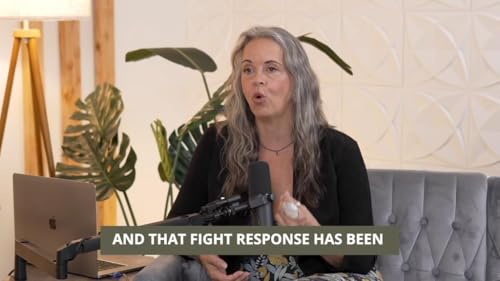What if those sudden waves of fear, shame, or despair are not "too much," but your nervous system remembering something your mind cannot see yet? In this episode, co-hosts Elisabeth Kristof, founder of the Neurosomatic Intelligence framework and the NSI Coaching Certification, and Jennifer Wallace, NSI educator and founder of Sacred Synapse, return to one of Trauma Rewired's most downloaded episodes: emotional flashbacks in complex trauma. Through personal stories, they explore how emotional flashbacks can shift perception, body sensations, and behavior in real time, and how NSI helps map these experiences as neurotags in the brain and body. You will learn how to recognize emotional and somatic flashbacks, why tiny cues can create giant waves of activation, and how these states connect with emotional neglect, toxic shame, boundary struggles, and other patterns of complex trauma. Elisabeth and Jennifer share how building daily capacity and emotional processing skills has changed the frequency and intensity of their own flashbacks over time. This episode offers a grounded, neuroscience-informed look at emotional flashbacks and post-traumatic growth. You will walk away with language to name your experience, a deeper understanding of how "state creates story," and hopeful frameworks for working with your nervous system more gently. Timestamps: 00:00 – Personal Story of an Emotional Flashback 00:39 – Who This Episode Is For 03:08 – What an Emotional Flashback Is (NSI Definition) 08:53 – The Greenbelt Experiment & Perception Shift 16:22 – Somatic Flashbacks & CPTS Patterns 22:18 – Holidays, Medicine Work & Intense Emotional Activation 33:05 – State Creates Story 45:15 – Repression, Completion & Daily Practice 50:21 – Post-Traumatic Growth Key Takeaways: Emotional flashbacks are often somatic flashbacks, with intense body sensations and state shifts even when there is no clear narrative memory. From an NSI perspective, a flashback is a neurotag activation that changes how the brain filters sensory input, which can make familiar places or people suddenly feel unsafe. Emotional flashbacks in complex trauma are intertwined with toxic shame, harsh inner critics, emotional neglect, attachment wounds, and boundary struggles. Behaviors like binge eating, drinking, overworking, shutdown, or chronic pain and inflammation can be protective outputs and important clues that a survival pattern has been activated. Consistent neurosomatic practice, emotional processing, rest, and supportive relationships can reduce the frequency and intensity of emotional flashbacks and support long-term post-traumatic growth. Resources Mentioned: Boundary Rewire Course: boundaryrewire.com – Repattern your nervous system for safer, more authentic boundaries. Rewire Trial: rewiretrial.com – Learn neurosomatic tools to regulate and rewire your system. BrainBased.com – Explore applied neurology and somatic tools for behavior change and resilience. Neurosomatic Intelligence Coaching Certification – neurosomaticintelligence.com Sacred Synapse on Youtube www.youtube.com/sacredsynapse-23 Call to Action: If this conversation resonated with you, subscribe to Trauma Rewired wherever you listen to podcasts and leave a review to help more people discover trauma-informed education grounded in neuroscience. For deeper support this season, explore Boundary Rewire—a 5-module neurosomatic course designed to help you repattern stress responses and create boundaries that feel safe, natural, and grounded in authenticity. It's just $27 through the end of the year. Disclaimer: Trauma Rewired podcast is intended to educate and inform but does not constitute medical, psychological or other professional advice or services. Always consult a qualified medical professional about your specific circumstances before making any decisions based on what you hear. We share our experiences, explore trauma, physical reactions, mental health and disease. If you become distressed by our content, please stop listening and seek professional support when needed. Do not continue to listen if the conversations are having a negative impact on your health and well-being. If you or someone you know is struggling with their mental health, or in mental health crisis and you are in the United States you can 988 Suicide and Crisis Lifeline. If someone's life is in danger, immediately call 911. We do our best to stay current in research, but older episodes are always available. We don't warrant or guarantee that this podcast contains complete, accurate or up-to-date information. It's very important to talk to a medical professional about your individual needs, as we aren't responsible for any actions you take based on the information you hear in this podcast. We invite guests onto the podcast. Please note that we don't verify the accuracy of their statements. Our organization does not endorse third-party content and the views of our ...
Show more
Show less
 1 hr and 10 mins
1 hr and 10 mins 56 mins
56 mins 50 mins
50 mins 56 mins
56 mins Nov 17 202535 mins
Nov 17 202535 mins 1 hr and 5 mins
1 hr and 5 mins Nov 3 202559 mins
Nov 3 202559 mins

